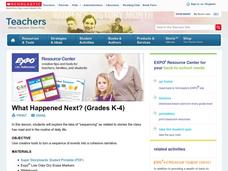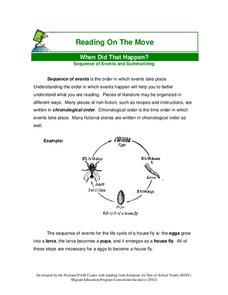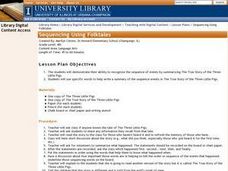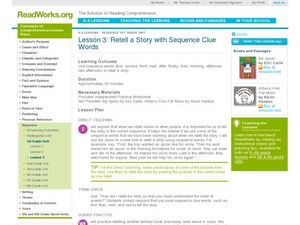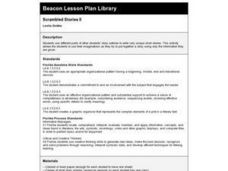Lakeshore Learning
What's Next? Sequencing Story
First, next, then, and, finally are the words in focus of a sequencing lesson plan. Scholars listen to a read aloud of the tale "Lost in the Fog," and take part in a grand conversation about the story's sequence of events. They then show...
Curated OER
Noisy Nora, Studious Students: Story Elements
Alliterative adjective nicknames generate stories inspired by Rosemary Wells' book Noisy Nora (also a thematic complement to any class with children who make a ruckus to get attention). Class members explore basic story elements --...
Scholastic
What Happened Next? (Grades K-4)
Explore the structure of narrative writing with this fun, collaborative lesson. Start by reading aloud a short story, asking small groups of learners to fill in key events on a large story board prepared on the class whiteboard....
Curated OER
When Did That Happen?
An awesome packet teaches individuals how to chronologically order and sequence events. The resource also provides practice that immediately follows the different ways to order events. Lastly, learners read a newspaper article...
IPDAE
Themes in Short Stories
"What is the theme of this story?" The very question can spark fear in the minds of readers and incinerate confidence. Here you will discover an exercise that shows how writers use the tools of setting, plot, conflict, and...
Curated OER
Story Structure Slide Show
Analyzing the sequence of actions in dramatic stories leads to deeper comprehension of story structure. The class identifies the main actions in each section of a story and develops frozen tableau's for the identified actions of the...
E Reading Worksheets
Summarizing Text
Help learners find the most important information in a text with a lesson on summarizing. As kids read through a passage about Johannes Gutenberg, they summarize small excerpts, put events in sequential order, and respond to two longer...
For the Teachers
Story Strips Sequencing
What happens next? Work on story sequence with a lesson that prompts kids to put a story back in order. Additionally, they discuss what would happen if one event was missing from the sequence.
Curated OER
Tear Into a Story
Learners retell a story using the correct sequence of events for a story they have listened to five times. They identify the characters and the setting for the story, and sequence the events using a dissembled copy of the book.
Curated OER
Story Retelling
Students explore storytelling by participating in an image analysis activity. In this story structure lesson, students read the book Cookie's Week by Tomie dePaola and retell the story to their teacher in sequential order. Students...
Curated OER
Story Sequence
In this story sequence learning exercise, students read five line nursery rhymes and then number the events in sequential order. There are four nursery rhymes on this two-page learning exercise. An answer key is included.
Curated OER
Story Pyramid
In this pyramid graphic organizer worksheet,students use the story organizer to sequence the events in a story. Students describe the five parts of the story.
Curated OER
Retelling Main Event in Sequence
Second graders practice retelling events from a fiction book. In this reading comprehension lesson, 2nd graders read Harry and the Lady Next Door and retell the main events of the story to a partner.
Curated OER
Compare Two Versions: Folk Tales, Sequencing, and Summary
Compare two versions of "The Three Little Pigs" (traditional and Jon Scieszka's The True Story of the Three Little Pigs, told from the wolf's point of view). As your 4th graders recount the familiar version of the story, emphasize the...
Curated OER
Sequence, Predict, Infer: Pink and Say
Practice sequencing with your 2nd graders via Patricia Polacco's Civil War book Pink and Say. Begin with a blindfold and a bag of mystery items. Connect their use of clues to identify what they can't see with the skill of making...
Curated OER
Comprehension: Create a Summary from a Narrative Text
If your class can sequence events in a story, are pretty good at retell, and can identify the main point, they are probably ready for reading comprehension through summarizing. This lesson provides a teacher's script that facilitates...
Houghton Mifflin Harcourt
American Stories: Challenge Activities (Theme 2)
For those class members who have mastered the basic concepts and need extra challenges, here's a packet of activities sure to engage them in stories about American immigration and exploration. Kids may design a dramatic presentation...
Curated OER
The Mitten
Explore the Ukraine through a reading of The Mitten. Readers will determine the sequence of events, cause and effect, make predictions, and find the main idea of the story. They also use math skills to make charts and graphs. Finally,...
Curated OER
Lesson 3: Retell a Story with Sequence Clue Words
First graders evaluate sequence words. In this order of events lesson plan, 1st graders practice using sequence words to retell a story. They do guided practice with the teacher retelling a story they have read as a class and then try it...
Curated OER
Body Sequencing
Fifth graders listen to a story told by their teacher. They have cards of all of the events in the story. They must "jump" into the correct order of events.
Curated OER
Sequence of a Story within a Story
Fourth graders read a story. For this story sequencing lesson, 4th graders learn about the use of flashbacks in a story. Students read Tell Me a Story, Mama and identify flashbacks in the story.
Curated OER
Total English Upper Intermediate: Sequencing Events
In this sequencing events worksheet, middle schoolers complete 6 sentence starters and write a story using one of 3 provided titles. In small groups students share their work.
Curated OER
Scrambled Stories II
Review story elements with your class. They will use examples from a story to develop critical-thinking questions. Then they use a graphic organizer to describe the setting, character, and plot of the story, focusing on how they...
Model Me Kids
Model Me Going Places 2
Social stories are wonderful teaching tools specifically designed for learners with Asperger's, autism, PDD-NOS, non-verbal learning disabilities, or other developmental disabilities. They are used to model appropriate social behaviors...




